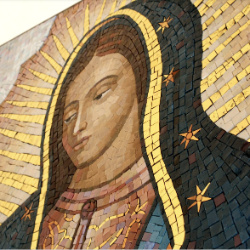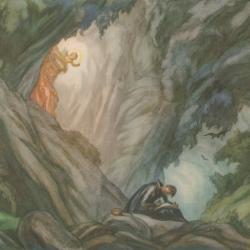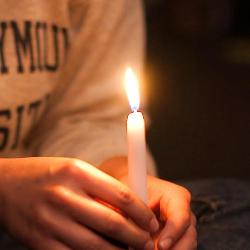
Till There Was You: Celebrating the Feast of Our Lady of Guadalupe
This Saturday, December 12, marks the Feast of Our Lady of Guadalupe, celebrated throughout the Americas. This feast commemorates a series of apparitions of the Virgin Mary to Juan Diego Cuauhtlatoatzin, an indigenous peasant living in what is now Mexico, during the 16th century. Today, Our Lady of Guadalupe is celebrated as the "Patroness of All the Americas" and her feast is a major celebration of faith and identity for Catholics across continents. Cecilia González-Andrieu (Theological Studies) invites us to consider the meaning of Our Lady of Guadalupe, and her appearance to Juan Diego, for each one of us today.
✜
Till There Was You
Cecilia González-Andrieu (Professor of Theological Studies)
There were bells on a hill,
But I never heard them ringing.
No, I never heard them at all,
Till there was you.
There were birds in the sky,
But I never saw them winging.
No, I never saw them at all,
Till there was you.
And there was music and wonderful roses, they tell me,
in sweet fragrant meadows of dawn and dew.
There was love all around,
But I never heard it singing.
No, I never heard it at all,
Till there was you.
- "Till There Was You," The Music Man (Wilson)
It is doubtful that the composer of the Broadway musical “The Music Man” knew the story of our Lady of Guadalupe, yet one cannot help but be struck by the amazing resemblance of what is described here to the events of Tepeyac. The story of Our Lady of Guadalupe and the song “Till There Was You” are both about the extraordinary power that Beauty has to completely change the way we experience the world around us. Until “there was you…” our Lady up on the hill of Tepeyac, an entire people could not see, hear, or feel God’s love. Today, she brings us that very same gift.
Can we hear the birds, or has the world grown silent for us? And most importantly, are we capable anymore of truly feeling ourselves loved by God?
The apparitions of Our Lady of Guadalupe fit into no stereotypes of Christian preaching that anyone could have conjured up in the middle of the sixteenth century; everything about this event was new, everything about the drama at Tepeyac spoke eloquently, not about a Reign of God yet to come in some other place, but about a Reign of God radically infusing our very world. Our Lady of Guadalupe came as a woman who knows that those around her need love, care and healing. Because of her, all of us from Juan Diego to today can look up and feel loved.
Our Lady of Guadalupe came then (as now) as a dramatic narrative preserved in both poetry and a luminous painting. Everything about her encounter with humanity surprises. It is before dawn, and a poor widowed man, a native who has been baptized with a new name (which perhaps does not feel truly his yet), is on his way to Church and to his daily cares. The first inkling Juan Diego has that something extraordinary is happening is the song of the birds, not only is the song exceedingly beautiful, but it seems to him that the hills are answering. Juan Diego looks up from his lonely road, one that he has traveled many times over, he looks up surprised by encountering beauty in a world that had long ceased being beautiful. Juan Diego is seized by that beauty, grasped to a degree that turns into contemplation and leads him to ask difficult questions.
As Virgilio Elizondo has pointed out, the Guadalupe event “marked the birth of a new Church: the Word of God enriching the situation and bringing newness out of the old, beauty out of the chaos, family out of previous strangers and enemies.” Yes, what Juan Diego and his community are called to by Our Lady is not a recovery of their old identity, broken and trampled by conquest, but rather growth, transformation and the fostering of their own prophetic voice into a new humanity. The human cycle of conquered and conqueror, of master and slave, of powerful and insignificant will continue unless Juan Diego, and every single one of us, risks doing something different.
Mary, who dares to say that God throws the mighty from their thrones and lifts the lowly (Luke 1:51-53) is clear with Juan Diego that she understands that the “lowly” cannot regain their voice alone. This is what her gift of beauty brings, for the cycle of oppression and oppressed to end, this new voice must arise from a place within the oppressed which is full of abundance, full of the expansive desire to share the world, not hoard it, otherwise, although the positions will be reversed, the cycle will continue.

The condition which surrounds Juan Diego of mutual exclusion, suspicion and exploitation seems like one of the most basic tragic flaws of humanity. It is this world that lies just beyond the beauty of that hill where Juan Diego meets the Lady; it encircles him with its specter of poverty, of non-being, and of death. We want to walk toward a new being, but how can we, when the old being demands so much of us? The answer that Our Lady’s story reveals is clear, -- God’s Reign does not mean an end to worldly cares, nor does it demand that we ignore these in order to follow the path up the hill. No, God’s Reign means we are not alone, that God takes those cares right into God.
This is a moment in the story when the Christian must experience something like a mirror --on the one hand, we are Juan Diego, grieved, hurried, fearful, and yet, if the Juan Diegos of the world are to be helped to gain their voice, we must also be the Lady. We, like her, must be willing to go out of our way to walk toward those who need us. We like her, must be willing to take up their cares with them, to lighten their loads, so they may continue to walk. Guadalupe’s beauty is in her very dynamism, in her willingness to do what must be done, so that the voice of the new people of America will rise.
As Pope John Paul II has reminded us, “true love sets no conditions; it does not calculate or complain, but simply loves.” In the gift of exquisite beauty, of birdsong and flowers, of a woman who brings comfort and also challenges, and in a poor man who raises his voice and with it a People, we recognize this most difficult of callings – to simply love. And it is just at this moment that we look up, and the voice of God reaches us anew and renewed and enfolds us, like Juan Diego’s warm mantle. The Lady brings the heavens in her starry veil, Juan Diego brings us and all the earth in his roughly woven mantle – and they both meet in the flowers, overflowing, in the miracle of the beautiful, incomprehensible, unexpected gift, of being simply loved by God.
Excerpted from “Till There Was You” In The Treasure of Guadalupe, ed. Virgilio P. Elizondo, Allan Figueroa Deck, and Timothy M. Matovina, 65-71. Lanham, MD: Rowman & Littlefield Publishers, 2006.
✜
More for Reflection
- How have I been surprised by beauty and grace recently? What have these surprises inspired in me?
- In what ways might I feel like Juan Diego as González-Andrieu describes the story? In what ways might I act like the Lady, taking up the cares of those I encounter?
- How can I respond to the call to simply love today?




